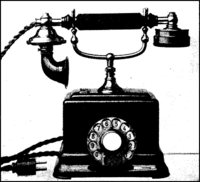Telephony
From Just Solve the File Format Problem
(Difference between revisions)
Dan Tobias (Talk | contribs) |
Dan Tobias (Talk | contribs) |
||
| Line 12: | Line 12: | ||
* [[Media Gateway Control Protocol]] (MGCP) | * [[Media Gateway Control Protocol]] (MGCP) | ||
* [[Modem]] | * [[Modem]] | ||
| + | ** [[Hayes command set]] | ||
* [[Session Initiation Protocol]] (SIP) | * [[Session Initiation Protocol]] (SIP) | ||
* [[Telephone numbering]] | * [[Telephone numbering]] | ||
Revision as of 05:25, 26 November 2013
Since Alexander Graham Bell invented the telephone in 1876, it has been a major feature in our lives, evolving from wired "Plain Old Telephone Service" (POTS) to now support a whole range of mobile phone protocols and Internet-based Voice Over IP (VOIP). AT&T introduced picturephones in 1964, but they didn't catch on then; however, various forms of video chatting are now commonplace to accompany traditional voice-only telephony.
- Fax machine
- Media Gateway Control Protocol (MGCP)
- Modem
- Session Initiation Protocol (SIP)
- Telephone numbering
See also Address books and contacts for formats used to store contact lists on mobile phones, and Audio and Music and Video for formats used to store sounds and moving images.
External links
- Bell System Technical Journal archives
- Classic 1960 article on signaling systems
- Fences as primitive phone networks
- Dial-up handshaking illustrated
- DIY cell phone
- Why your cell phone doesn't have a dial tone
- Interview about phone phreaking
- 1964 Modem Reaches Out And Touches The Internet
- Cell phone data mining
- Exploding the Phone
- 1990s telecommunications as predicted in 1969
- Video: Making phone call through 1950s electromechanical exchanges
